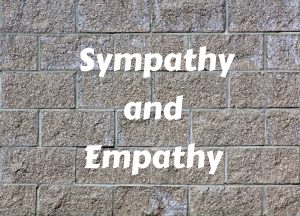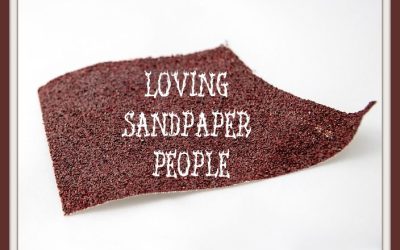
Do you know anyone who has lost a loved one? A spouse, a child, a parent?
I’ve watched people around me lose those they love through illness, accident, old age, or even by self-inflicted means. And I’ve felt bad for them. Sympathy. Knowing about their loss and pain, without truly knowing loss and pain of a similar magnitude.
Is sympathy enough?
Sometimes it has to be, because it’s all we have to give. Still, while we say we understand or we know how the other person feels, we may not. Not really. How can we, unless we’ve had a similar experience? Even then, no two people are the same, no two relationships are the same, and no two losses are the same.
But even though every loss is unique, it’s empathy—not sympathy—that enables us to reach into the depth of our own feelings of pain and loss as we come alongside other hurting people.
Never have I been personally aware of this truth as much as I am now. There’s a sisterhood—and brotherhood—who are members of a club no one wants to join. The pain of loss is often near, regardless of how much time has passed. It hovers just below the surface, breaking through at unexpected moments in ways that leave you gasping for air as though a drowning man.
But that pain is what enables one person to come alongside another and say “I understand” in a way no one else can. Empathy. My heart and spirit are touched when another widow shares her similar circumstance. Or maybe she doesn’t say anything at all. Sometimes it’s enough for our eyes to meet in mutual pain, or to share a hug for physical comfort.
The need for empathy also transcends personal relationships or shared loss. It’s needed on a grander scale in our culture and in our world.
We’ve lost our collective ability to empathize. And if we haven’t lost our ability to empathize, then in many cases we’ve lost our desire. In the process, we’ve become adept at dehumanizing our fellow human beings. Political victories take center stage and are pursued regardless of the cost.
What would happen if we acknowledged others as being motivated by their own pain and need for acceptance? How can we come alongside and say, “I understand,” and then offer biblical alternatives for addressing their pain?
To be able to say to the pregnant young woman, “I haven’t experienced a crisis pregnancy, but I know what it is to be frightened as I face the unknown future. May I offer you practical resources and also share with you about the One who holds that future?”
Or to say to the person who chooses to deny God’s existence, “Trusting God was hard for me, too, because I’d been let down too many times to ever want to trust anyone again. May I share how this changed in my life?”
To really listen to those with whom we disagree politically or socially, and empathize with their hopes and dreams, even though we disagree with their goals and values.
Are we guaranteed to make a difference on a grand scale? No. Still, we might make a difference in the life of one person. And perhaps that’s the work God has for us to do at such a time as this.
Sympathy says, “you poor thing.” Empathy says, “I really do feel your pain.
Empathy does not require compromising our values, but it does allow us to truly hear the other person’s heart before we answer. In that moment, the Holy Spirit has an opportunity to equip us to respond with love, grace, and humility.
So, the next time you find yourself feeling critical or being drawn into a disagreement, ask God for the ability to reach down into your own pain for the empathy the other person desperately needs.
Have you received another person’s empathy?
How did you feel as a result?





I’ve seen empathy take the bluster right out of hurting people lashing out in pain. It’s like the teacher whispering to a roomful of noisy students, they get quiet to listen. So many hurting people in the world, they aren’t really angry, they’re lost. 💔 Thanks for the reminder, Ava.
Love that analogy, Paulette!
This is a lot to think about,Ava. I didn’t receive much empathy when my mother had dementia for several years and then died. It was devastating. People said they were sorry but didn’t want to sit and ask how I was feeling. The experience made me want to help people more than just a few words. I want to be better to express true empathy to others.
Oh, Diane, I’m truly sorry for your loss. Superficiality is painful, isn’t it? And I agree with you – being on the receiving end of it makes me more committed to expressing true empathy.
Many people are at a loss as to what to say when a person is grieving so they say nothing. Often times a grieving person will lash out at someone who doesn’t say the right thing. That makes people shy away from him/her. Just like there are stages of dying identified by Kubler-Ross, there are stages of grief that include the same stages that the grieving person goes through. Anger is one stage and during that period, which can last a long time, it’s difficult to know how to help the person. Grief counseling which is usually in groups is very effective because the groups are comprised of people experiencing similar grief. When my sister died none of my coworkers said a word when I returned. People are simply afraid of saying the wrong thing.
When we had the horrific loss of our beloved sweet
Daughter I often felt like ” the elephant in the room”.
Most people at the work place, and long time neighbors
Pointedly avoided us. We even lostThe friendship of
A couple who were dear friends many years. Conversely, our church, the pastors and Christian
Friends were supportive and available in so many
Ways. God saw us through that time by drawing us
Closer to himself. Ava, we know that is true for you
As well. God has also blest you with the gift of
Empathy for those hurting around you. Thank you!
That’s true, Debra. Still, often words are not necessary. There are times when a look or a hug can communicate more than words ever could.
P.S. My heart aches for your loss. I pray God’s comfort for you in ways that are tangible and grace-filled.
Thank you, Vicki.
Your loss was unimaginable to most people. And my heart aches for you and Ray as you live with this loss every day.
Praying God continues to wrap you in His comfort and grace hour by hour and day by day.